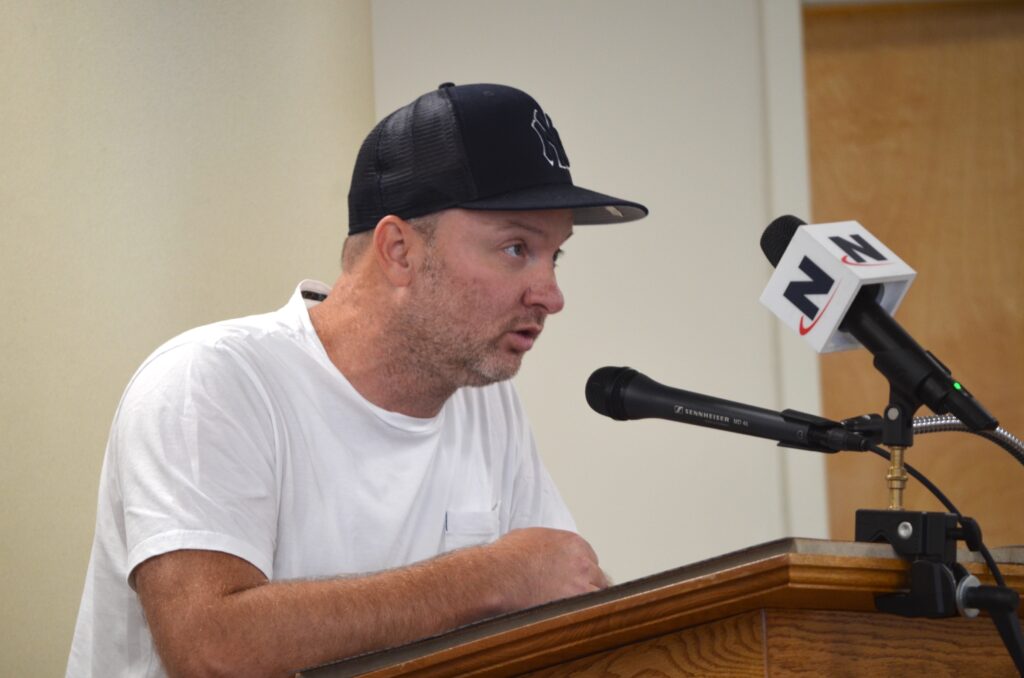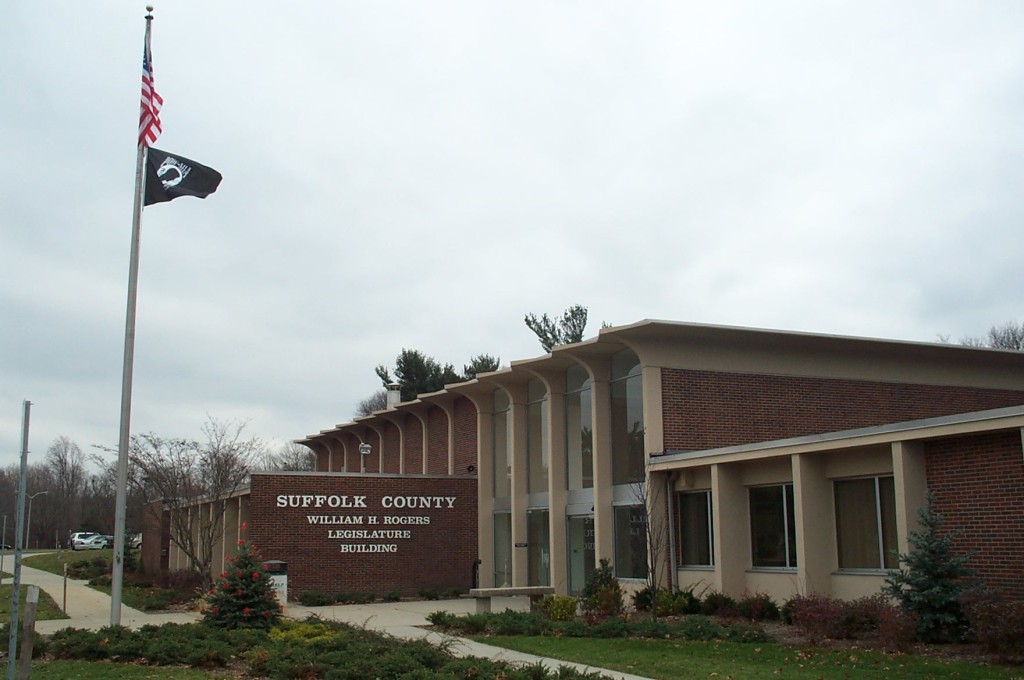Local impacts of SCWA pipeline weighed at Town Hall

With strong claims of a lack of transparency from the Suffolk County Water Authority as to how the construction of its proposed 8.15-mile water pipeline will directly impact the town, Riverhead officials conducted their own Monroe Balancing Test to determine if the SCWA’s project should be exempt from local zoning and land use regulations.
In the last week, between a public forum held Aug. 13 and the public hearing at Tuesday night’s Riverhead Town Board meeting, both Riverhead and Southold town officials and community members have thoroughly questioned the benefits of the proposed $35 million North Fork Transmission Line from Flanders to Laurel.
The SCWA has continued to stress that the sole purpose of the pipeline is to draw water from existing wells in the Flanders area to meet demand in Southold, which the agency’s attorney, Brody Smith, said provides public safety solutions. These, he said, include addressing the threat of PFAs detected in Orient’s private wells and aiding area fire departments in emergencies.
However, when evaluating the significant construction that would take place through Riverhead, town officials repeatedly questioned the exact benefit the pipeline has for Riverhead itself, and why the SCWA refuses to list Riverhead Town as an involved agency in the process.
Confusion among Riverhead town officials and consultants also remains over the exact placement of the water main extension, as do concerns about their exclusion from the actual planning of the pipeline and a general distrust for the consideration of the project’s local impact.
“[The SCWA is] trying to fly the plane while they’re building it,” said Jeffrey Seeman, the environmental consultant hired by Riverhead Town. “Without the ability to have strong engineering plans, other than this routing line on a map, it’s been very difficult for our team to assess not only what the impacts would be, but where the location of this project is physically placed.”
With no knowledge of what other infrastructure may be in the way during construction, and no bounds with which to assess any requirements for easements or land purchases, Mr. Seeman strongly recommended that no exemptions be granted under Riverhead Town’s site plan review process.
SCWA pipeline plans were evaluated by Riverhead town officials on Tuesday through a Monroe Balancing Test — a nine-part process used to assess the nature of a proposed project, its impact on the local community and how the public would benefit. All of these components factor into determining whether or not the project should be exempted from land use regulations and local zoning rules. Questions were also posed about alternative locations for the project and whether other ways to meet Southold’s water demand were considered.
The SCWA believes they should be granted immunity because the pipeline is addressing a “regional problem” and Riverhead’s land use regulation would “defeat” that solution. Mr. Smith also stressed that construction impacts would be temporary and any disrupted land would be restored.
Other locations were explored for the pipeline, as was potentially increasing the number of wells in Southold, Mr. Smith said. However, SCWA found that the town’s aquifer system would not be able to support the well increase and that, regardless of the availability of alternative routes, the water main must travel through Riverhead to get to Southold.
Mr. Smith also noted that the SCWA previously installed 7,000 feet of water main in Riverhead and is currently installing around 20,000 feet of main in the Manorville area, neither of which required the water authority to obtain local approval.
“That has been the relationship between the two entities, that has been the standard operating procedure for as long as anyone can remember,” Mr. Smith said. In a rebuttal, Councilman Kenneth Rothwell and other town officials claimed SCWA left local roads in poor condition in the construction process.
SCWA was also criticized for closing its scoping session on Aug. 4, after the town requested it be kept open until after the Monroe public hearing was conducted. Mr. Smith hand delivered a letter from SCWA’s legal representation to Riverhead town officials that described the town’s actions on the pipeline project as “confounding.”
The SCWA alleged in a letter to their attorney that they were not invited to the town’s Aug. 13 public forum and expressed the information presented was “one-sided.” Riverhead town attorney Erik Howard previously told the Riverhead News-Review he had not received any information indicating SCWA intended to participate in the public forum, nor did he hear from SCWA when they were notified of the public hearing.
“This smells strongly of the fox in the hen house. You design it, you approve it, and you do it, and step all over Riverhead while doing it, with no benefit to us whatsoever,” said Riverhead Town Supervisor Tim Hubbard. “This doesn’t cut it for the people in this town, so there’s going to have to be some sit-downs with the Suffolk County Water Authority.”
At the public forum at Riverhead Town Hall last week, Southold Town Supervisor Al Krupski commended Riverhead for its informational and municipal efforts regarding the pipeline project, and agreed that concerns regarding the pipeline’s impact on Southold and Riverhead have not been openly discussed.
Recent scientific studies have seemingly played no part in the development of the pipeline proposal, Mr. Krupski said regarding the Monroe Balancing Test. He noted that the reason given by the SCWA for not including studies like the United States Geological Survey study in Orient was that its report has not been finalized yet.
Southold Town officials expressed an interest in partnering with Riverhead Town as a “unified front” to have their questions and concerns answered throughout the scoping period of the project proposal.









